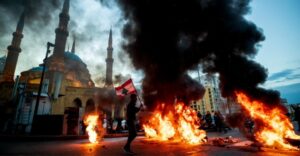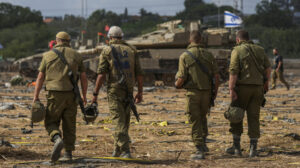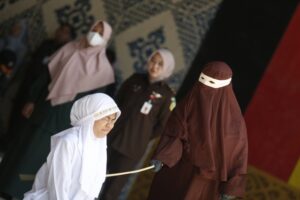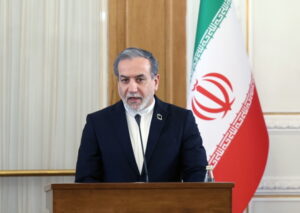Israel is escalating its attacks against Hezbollah, with the international community concerned about the Lebanese organization following the assassination of its senior official.
The Lebanese Shiite movement Hezbollah confirmed on Friday night that Israeli armed forces killed a key member of the movement, Ibrahim Akil, hours after the Israeli general staff announced it.
Ibrahim Akil, “one of our great leaders,” was killed “on the road to Jerusalem,” in the terminology Hezbollah uses when referring to victims of Israeli military operations.
Although the militant group has not provided further details about his killing, it described the attack as a “crime.”Israel will pay the price, the group added.
“If Hezbollah does not stop its attacks, we will expand our targets,” an adviser to Prime Minister Benjamin Netanyahu told Saudi media outlet Al-Arabiya late Friday night. “The previous red lines no longer exist,” he said matter-of-factly.
Earlier, Israel had announced the death of a Hezbollah official in a “targeted strike” in Lebanon’s capital Beirut after Hezbollah launched a rocket attack on the border in response to a wave of explosions of the group’s communication devices that the Lebanese Shiite movement blames on Tel Aviv.
The IDF attack targeting Ibrahim Akil, whom the Israeli military described as “the head of operations of the Hezbollah terrorist group,” also killed 14 people and wounded 66 others, according to the Lebanese National News Agency.
An Israeli airstrike on Beirut has killed 14 people, including a top Hezbollah military commander, in a major escalation to the conflict between Israel and the group.
Read more: https://t.co/uVF3IEmjLt pic.twitter.com/Q1z4Lcc5HB
– SBS News (@SBSNews) September 21, 2024
Concentrated in basements underneath residential buildings
In addition to Akil, the Israeli army said the Israeli army killed senior members of Hezbollah’s operations battery and the leadership of the Radwan force in the strike. IDF spokesman Daniel Hagari said the strike also killed 10 Hezbollah commanders, who he said were responsible for “actions against Israel daily.”
“They gathered underground, under a residential building, in the heart of Dahiyeh, while using civilians as human shields. They met to coordinate terrorist activities against Israeli civilians,” the IDF spokesman said at a press conference.
Lt. Gen. Daniel Hagari said at least 10 members of the Radwan force and Hezbollah’s operations battery were killed in the strike, which Lebanese media said was carried out by an Israeli F-35 fighter jet using two missiles.
An Axios report quoted an Israeli official as saying that some 20 Radwan Force commanders were killed.
A French News Agency photojournalist at the scene of the attack saw a collapsed building and rescuers removing victims amid chaos.
“Targeting a residential, urban area proves once again that the Israeli enemy does not take into account any humanitarian or legal factor,” Lebanese Prime Minister Najib Mikati said.
The profile of the “global terrorist”
Akil, known as the “global terrorist,” had served in Hezbollah’s highest military body, the Jihad Council, and had been sanctioned by the United States for involvement in two terrorist attacks in 1983 that killed more than 300 people at the U.S. Embassy in Beirut and the U.S. Marine Corps barracks.
Akil began his Hezbollah career in the 1980s in the Islamic Jihad apparatus, which is responsible for Hezbollah attacks outside Lebanon, and was involved in numerous attacks carried out in various countries against innocent international actors and civilians. Since 2004 he served as Hezbollah’s chief of operations, as part of which he was responsible for Hezbollah’s activities in the areas of sabotage attacks, anti-tank fire, explosives, air defense, and other military aspects.
In addition, he served as commander of the Radwan unit, Hezbollah’s elite force, whose objective was to take over Israeli Galilee settlements and kill innocent soldiers and civilians.
Last year, the State Department published a $7 million reward for information leading to his identification, location, capture or conviction and advised that he was responsible for the capture of American and German hostages in Lebanon in the 1980s.
The United States had a $7 million bounty on Ibrahim Aqil because he murdered 241 Americans in 1983.
Israel just saved the US $7 million.
???? pic.twitter.com/n0g9CNrpKU
– Max ? (@MaxNordau) September 20, 2024
Hezbollah has vowed revenge – US and UN call for restraint
The prospect of all-out war between the US ally and the Iranian-backed militant and political group appeared closer than ever, leaving the Middle East tense as Hezbollah chief Hassan Nasrallah vowed revenge and Israel moved into the “new phase” he said the conflict had entered.
Earlier, the IDF had also “struck” southern Lebanon, where its air force late on Thursday struck some 100 Hezbollah launchers and other infrastructure sites that he said, were about to be fired into Israeli territory – one of the heaviest firings in the region since the two sides began exchanging regular fire in the wake of the Hamas-led terrorist attacks on Oct. 7 and Israel’s offensive on the Gaza Strip.
The attacks began earlier this week when thousands of bombs and walkie-talkies used by Hezbollah operatives exploded almost simultaneously across Lebanon, killing at least 37 people, including two children, and wounding nearly 3,000. Most of the wounded were civilians, Lebanon’s health minister said Friday.
The explosions spread fear and chaos across the country, overwhelming hospitals and leaving people afraid to use electronic devices.
They also left a trail of companies in Asia and Europe, with authorities in Taiwan and Bulgaria on Friday downplaying links to the complex operation.
Despite calls for restraint from the US and its allies, the two sides continued to escalate.
The UN, declaring itself “very concerned” about the situation in Lebanon following Israeli strikes in that country, called for “de-escalation” and “maximum restraint”. “We are very concerned about the increasing escalation around the Blue Line, including the deadly strikes today in Beirut. We call on all sides for an immediate de-escalation. The whole world must show maximum restraint,” said Stéphane Dujarric, the spokesman for the Secretary-General of the Organization, Antonio Guterres.
For his part, Israeli Prime Minister Benjamin Netanyahu issued a terse statement saying Israel’s goals are clear and its actions speak for themselves, Israeli media reported.
Prime Minister Benjamin Netanyahu:
Our goals are clear, and our actions speak for themselves.
– Prime Minister of Israel (@IsraeliPM) September 20, 2024</blockquote
The Israeli military assured that it had no intention to increase tensions in the region. “We are not acting with the intention (of causing) a major escalation in the region. We are acting in accordance with the predetermined objectives (of the war) and we will continue to do so,” said Israeli forces spokesman, Rear Admiral Daniel Hagari, at a briefing for reporters.
Iran condemns “barbaric and illegal attack”
Meanwhile, Iran’s Foreign Ministry tonight condemned the “barbaric and illegal” airstrike by “the Zionist regime” which “constitutes a flagrant violation of international law as well as a violation of Lebanon’s national sovereignty, territorial integrity and national security,” its spokesman Nasser Kanani said in a statement.
“There is no doubt that the Zionist regime seeks to escalate tension and expand the geography of war and conflict in the region,” he continued, adding that “such an illegal policy poses a clear threat to peace and international security.”
Israel’s victory, Hezbollah’s retreat
The sudden attacks on Hezbollah were a victory for Israel’s intelligence agency and a humiliating setback for Lebanese fighters and their Iranian patrons, Western officials and former intelligence officers said.
According to the US, Israel sees the “targeted killings” as a way to deter attacks on the country, fuel fear among its enemies and get revenge
But such operations often yield only temporary successes with no lasting results, experts and former intelligence officers say.
“Hamas, Hezbollah and the Iranians are quick to pick the successors to the assassinated,” said Bruce Riedel, a former career CIA officer who served in the Middle East. Iran’s nuclear program is closer to building a bomb than ever before, even after killing several nuclear scientists, he said.
Ask me anything
Explore related questions





